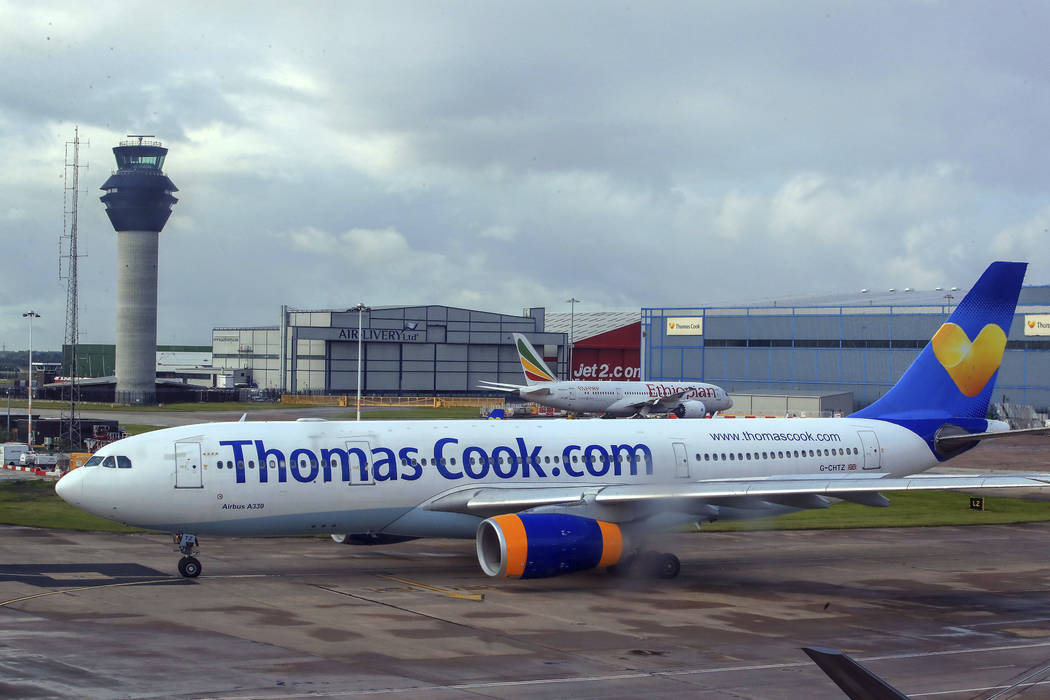British tour operator Thomas Cook collapses, bookings canceled

LONDON — British tour operator Thomas Cook collapsed after failing to secure rescue funding, and travel bookings for its more than 600,000 global vacationers were canceled early Monday.
The British government said the return of the firm’s 150,000 British customers now traveling elsewhere would be its largest repatriation in peacetime history. It was unknown how many of those customers were in Las Vegas, where Thomas Cook Airlines operated from Terminal 3 at McCarran International Airport. As of Sunday evening, the former check-in area for Thomas Cook was empty, and the screens overhead no longer displayed the company’s name.
Joe Dekasha, who works for Swissport International at the airport and had served as the public information officer for Thomas Cook there, said Sunday he couldn’t comment.
The Civil Aviation Authority said Thomas Cook has ceased trading, its four airlines will be grounded, and its 21,000 employees in 16 countries, including 9,000 in the UK, will be left unemployed.
The debt-laden company had said Friday it was seeking 200 million pounds ($250 million) to avoid going bust, was in talks with shareholders and creditors to stave off failure. The 178-year-old firm also operated around 600 UK stores.
CAA said it had arranged an aircraft fleet for the British repatriation effort lasting two weeks beginning Monday.
“Due to the significant scale of the situation, some disruption is inevitable, but the Civil Aviation Authority will endeavour to get people home as close as possible to their planned dates,” it said in a statement.
Most of Thomas Cook’s British customers are protected by the government-run travel insurance program, which makes sure vacationers can get home if a British-based tour operator goes under while they are abroad.
Recent struggles
Thomas Cook, which began in 1841 with a one-day train excursion in England and now operates in 16 countries, has been struggling over the past few years. It only recently raised 900 million pounds ($1.12 billion), including from leading Chinese shareholder Fosun.
In May, the company reported a debt burden of 1.25 billion pounds and cautioned that political uncertainty related to Britain’s departure from the European Union had hurt demand for summer holiday travel. Heat waves over the past couple of summers in Europe have also led many people to stay at home, while higher fuel and hotel costs have weighed on the travel business.
The company’s troubles were already affecting those traveling under the Thomas Cook banner.
A British vacationer told BBC radio on Sunday that the Les Orangers beach resort in the Tunisian town of Hammamet, near Tunis, demanded that guests who were about to leave pay extra money for fear it wouldn’t be paid what it is owed by Thomas Cook.
Ryan Farmer, of Leicestershire, said many tourists refused the demand, since they had already paid Thomas Cook, so security guards shut the hotel’s gates and “were not allowing anyone to leave.”
It was like “being held hostage,” said Farmer, who is due to leave Tuesday. He said he would also refuse to pay if the hotel asked him.
The Associated Press called the hotel, as well as the British Embassy in Tunis, but no officials or managers were available for comment.